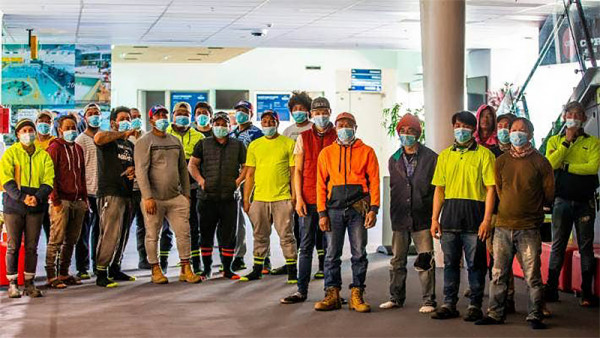Growing people and communities – in the Pacific and New Zealand
4 May 2022

RSE workers arriving in October 2021. Source: Brya Ingram/Stuff
The New Zealand horticulture industry provides employment for an estimated 60,000 people. These people are involved in a wide range of activities, from readying the soil to selling the fruit and vegetables, domestically and overseas, a complete field to fork, paddock to plate cycle.
Our industry – like many in this country – has suffered from a labour shortage, due to Covid and the borders effectively being closed until recently. Throughout the industry, employers have gone out of their way to attract and retain people. I know of several heartening stories where New Zealanders, who have struggled for years for whatever reason, have gained employment that has enabled them to turn their lives around and support their families.
The New Zealand Recognised Seasonal Employer (RSE) scheme has been operating for 15 years. Over that time, many employers have formed bonds with workers from the Pacific, and their families and villages.
The theme of this year’s RSE Conference is ‘Voices of the Pacific'. The conference will provide a platform to bring all the voices – Pacific leaders, New Zealand leaders and industry – to the table as we set a strategic pathway for the next 10 to 15 years of the scheme. This is as much about supporting development in the Pacific as it is about offering the New Zealand horticulture and viticulture industries a seasonal workforce.
Pacific leaders will give their perspective at the conference, as will the New Zealand Government, which I expect will be of much interest to RSE employers as our Government moves to review the operation of the scheme, and the policy that governs and supports it.
The New Zealand RSE scheme is very different to the Australian Pacific Australia Labour Mobility (PALM) scheme. There are far more checks and balances in our scheme to ensure worker wellbeing. It is also important to remember that our scheme is run by the New Zealand Government in close consultation with the Governments of the Pacific nations that participate in the scheme.
All New Zealand RSE employers must be granted RSE status to then apply for an Agreement to Recruit (ATR) from the Government. This is a rigorous process, which includes minimum standards around terms of worker pay and deductions, accommodation and transport. Pastoral care is also an essential, and many employers have people dedicated to this role.
The World Bank rates the New Zealand RSE scheme as one of the best performing in the world. This is high praise; however, our industry knows it cannot rest on its laurels. That is also why the Government’s review is important. Where does the scheme go in the future as the world adjusts to Covid and climate change? How can the scheme deliver more for both the Pacific as well as the New Zealand horticulture and viticulture industries?
I am sure there will be lots of debate and passion at this year’s RSE Conference, and I look forward to seeing as many RSE employers as possible there.
